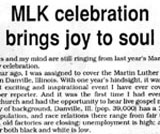{TITLE} {COMPANY_NAME}
 |
|
Links
|
|
Dear {GENDER} {LAST_NAME}: 
Martin Luther King, Jr. is widely remembered for his powerful public sermons, such as his landmark “I have a dream” speech in 1963 at the Lincoln Memorial in Washington, D.C. Rev. King, the preacher, is also remembered at church sanctuaries throughout the nation, where his powerful words still echo. In his preaching style, King drew on the rich traditions of the African-American church, including the prophetic tradition, the jeremiad, and the theology of liberation. Read about the history of the black church in America in the SageLaw primers, "Following the Streams of African-American Religion" with Morehouse College's R. Drew Smith, and "Foundations of the Black Church" with Michael Dash, associate professor of ministry and context at the Interdenominational Theological Center in Atlanta.
Outside of the church, King effectively mixed the rhetorical style of African-American preaching with another powerful tradition in American life known as civil religion – a belief system that binds the nation’s deepest-held values with transcendent meaning. In his appeal to a higher authority to address the nation’s shortcomings, King applied a potent mix of civil religion and the prophetic tradition. Read more about King's use of civil religion in the SageLaw article, "Analyzing King's Rhetoric and Civil Religion." |


